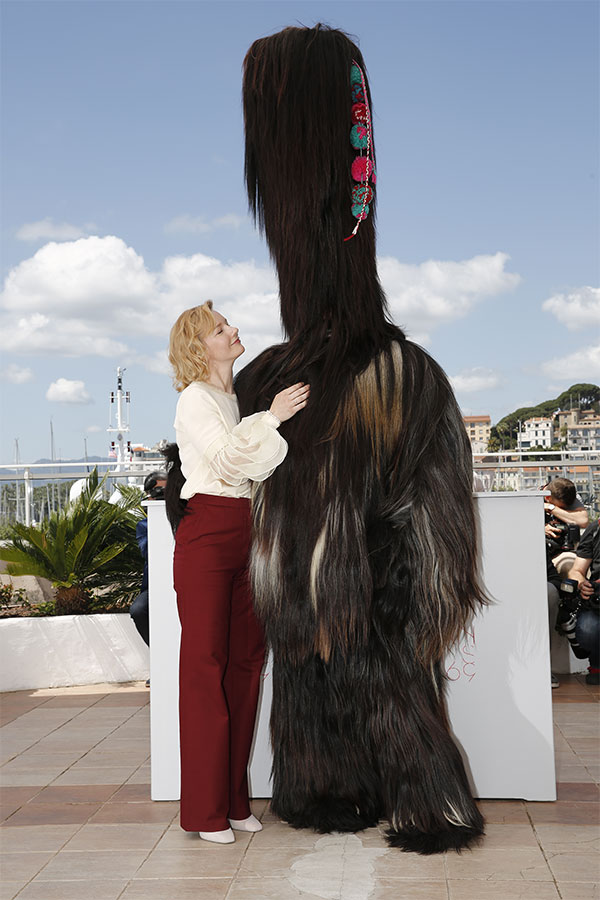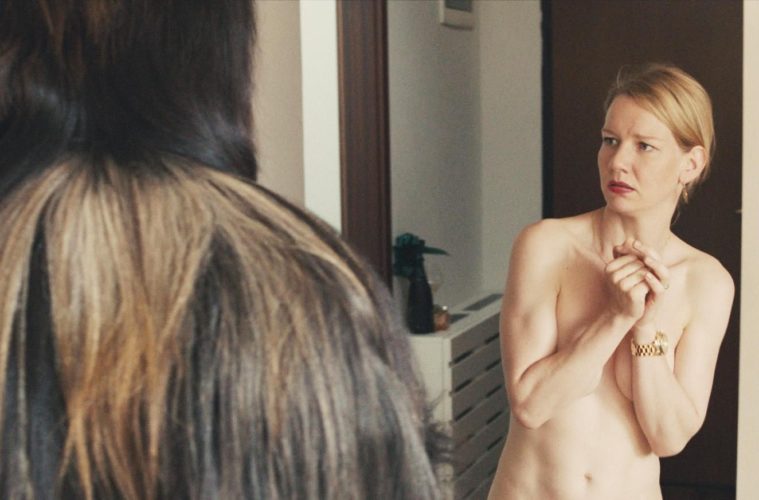
It’s been seven years since Maren Ade‘s second feature Everyone Else premiered at the Berlinale, taking home the Jury Prize, and we’ve been waiting for her follow-up since then. Toni Erdmann has now arrived in competition at the Cannes Film Festival, following Winfried (Peter Simonischek), who plays bizarre, awkward pranks on his daughter, Ines (Sandra Hüller). We said in our review, ” Now that her new directorial effort is finally here, it validates all the eager anticipation, as Toni Erdmann is one of the most stirring cinematic experiences to come around in a long time.”
We had the chance to speak with the director while at the festival while at a roundtable and we discussed what she’s been up to in the interim, the length of the feature, being inspired by personal experiences, what it was like making a German comedy, and much more. Check out the conversation below.
Seven years have passed since Everyone Else. Has it been difficult to get this new project financed?
Fortunately, the success of Everyone Else — which had 200,000 admissions in Germany — made quite an impact so it actually wasn’t that hard to put the financing for this film together. The fact that the script had comedic elements also helped. The simple reason for this seven-year gap was that I’ve been working so much — I didn’t take a break, as one might suspect. On the contrary, I worked on this script for about two years, then prepared the shoot, shot it, edited it for three months. Then came the rest of post-production…
How much footage did you shoot?
120 hours. Of course, when you shoot digitally, you end up with a lot of waste — I’d say about 20 hours of that came from times where we just kept the camera rolling.
Were there concerns about the length of the movie? Did you cut other versions with different lengths?
Well, I hadn’t planned for it to be so long. I was thinking maybe 130 minutes, just a bit longer than Everyone Else. In September or October 2015 I did cut a version that long. Then I gave birth to a child. Six weeks later, I rushed back to the editing room and ended up actually putting back things I’d cut out, because the shorter version of the film felt, in fact, longer, if that makes sense. I think that’s due to the fact that some of the logic goes missing through the shortening.
 No one warned you it might be too long?
No one warned you it might be too long?
Oh, sure. Especially the distributors. I mean, I get it, of course, since a movie this long would take up the time of two showings. They warned me that buyers might not even show up at the market screenings because of the length. Although people have also told me that this year there are other long films in Cannes and that mine is just 15 minutes longer than average, which sounds okay to me.
Did your role as a producer of the film factor in decisions like this?
Well, producer or not, I’ve always felt that you have to try things out and see what feels right. When you allow yourself some time editing a film, you do find out how it works best. With all these films we’ve produced, we’ve always tried not to rush it for festivals or any deadlines. Like I said, I don’t believe a film is made more appealing just because it’s shorter. If it’s less good shorter, it’s less good.
The film is not just longer altogether, but has many – for comedies, at least — unusually long takes, like the “Greatest Love of All” scene. Can you talk about the reasoning behind that? How did you know the comedy would work that way?
Of course I’d hoped it would work. But, for example, this egg-painting scene right before the performance — I’ve tried for umpteen times to make it shorter. You ask yourself: why would anyone want to watch these people paint eggs for minutes on end? But when you take it out, the whole song doesn’t feel probable anymore. The audience wouldn’t then go along with what happens. Especially during these plot transitions when something unlikely happens, you need to really be precise about your choices so that people would believe it.
But having her do the whole song! That was such a bold move.
Well, there’s one verse missing! It was even longer but that part I cut out.
How did you come up with the idea for these characters? Are they inspired by personal experiences?
The father figure is certainly inspired by my own father to some degree, who also has a great sense of humor and a large repertoire. So that part was relatively easy. And I was just interested in the dynamic of role play that existed between the father and daughter, how they can get to know each other anew through it. As for her: I really wanted to choose a profession that’s completely different from mine. I find it nice when you get to learn something through working on a film. On my previous two films I’ve only done some peripheral research, but, this time, I really dug into it. What does it mean for someone like her to bring her father to a business occasion like this reception in the film? What makes parents difficult, or why we can be so embarrassed by them is that everything gets so terribly private when your parents are involved. It can’t get more private, really.

The dialogue of the film sounds very authentic. Was there any improvisation or was it all scripted?
I do try to encourage an atmosphere on set where people aren’t afraid to try things, where surprises happen, but, in this case, it was more or less all scripted out.
What research did you do for the role of the daughter?
I met with women from different businesses and got a peek into their worlds. Soon I was intrigued by the job of business consultants because, in some way, they’re also playing a part. They need to sell things, keep up appearances, etc. In that sense, it’s interesting to see how she rejects the role in the movie while he starts to assume one.
Did you have your sights set on Cannes from the start or did you also consider the Berlinale?
I had definitely meant to submit it to the Berlinale but I became a mother again in November, so that was no longer a viable option because I couldn’t have finished it in time. As for Cannes: it was quite a gamble on my part because, in order to meet the deadline, I had to work a lot right after giving birth, without knowing if we’ll be chosen or not. So just weeks after delivery I was already back at work, with the baby and the sitter. That wasn’t exactly a pleasant experience. If it hadn’t panned out eventually, I would have felt like the biggest idiot in the world. But it did work out, so it’s all worth it. Before that we really sat ourselves down to consider if the film had a shot at all. When we decided to do it, we didn’t want to take any chances and sent the film in fairly late, too, when it was already in the near-finished stage.
In Cannes there’s the German thing (no German film has been in competition in 7 years) and the female thing (#CannesSoMale). Any thoughts on breaking both of those taboos?
I’m kind of used to both labels by now – the German and the female one. I think it would be a little silly to think the problem of having too few female filmmakers is solved now that I’m here. But if I can make the German film industry happy with my presence here, then I’m glad. In any case, it was definitely more of an issue before the film premiered. Now that people have seen it, I feel like the picture can speak for itself.

Both Peter Simonischek and Sandra Hüller are outstanding. Did you have them in mind from the very start?
No, I really had to look for and cast these actors. I wouldn’t have just thought of Peter for that part. He had to completely change his hairdo, for starters, especially as Winfried — as opposed to alter ego Toni Erdmann.
When I was watching the film, some of it reminded me of Judd Apatow’s work, what with the loser guy vs.. tough girl dynamic and the humor of the ejaculation scene. Were these gags built in the screenplay or were they natural extensions of the characters?
I think they come from the characters themselves. I’m not really familiar with Apatow’s work. What inspired me were, rather, Andy Kaufman’s movies. Otherwise, I can’t really name specific references. I did a lot of research on comedians with alter egos. Then there’s this one other film — which is not necessarily cinematic gold but I enjoyed as a teenager — called My Father the Hero, starring Gérard Depardieu. It also deals with a father-daughter relationship extensively.
Especially for audiences outside of Germany, the term German comedy almost passes for an oxymoron. What do you think helped this one break that stereotype?
Well, I think it’s not a pure comedy in the sense that the father does funny things for a sad reason. It’s not that I’ve just taken it upon myself to tell jokes with this film. Of course the figure of Toni could have been infinitely blown-up – I still have footage of all the crazy things that Peter tried out – but most of it we couldn’t use because it simply wouldn’t be believable. I think the central narrative of the film is the inner conflict between father and daughter, which is why I worked very hard on making sure people can somehow identify with both of them without it becoming too one-sided. It’s something I had tried to do with Everyone Else, but I think that film eventually sided more with the girl. Here, I tried to balance it out even more.
Toni Erdmann premiered at the Cannes Film Festival and will be released in the U.S. by Sony Pictures Classics. See our coverage below.


